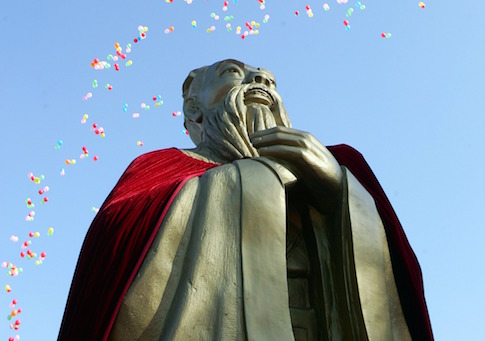The CIA has issued a classified report detailing China's far-reaching foreign influence operations campaign in the United States, which imparts financial incentives as leverage to permeate American institutions.
In an unclassified page of the report obtained by the Washington Free Beacon, the CIA cautions against efforts by the Chinese Communist Party to stipulate funding to universities and policy institutes in exchange for academic censorship.
"The CCP provides 'strings-attached' funding to academic institutions and think tanks to deter research that casts it in a negative light," the report says. "It has used this tactic to reward pro-China viewpoints and coerce Western academic publications and conferences to self-censor. The CCP often denies visas to academics who criticize the regime, encouraging many China scholars to preemptively self-censor so they can maintain access to the country on which their research depends."
The CIA warning joins a growing call by U.S. lawmakers and intelligence officials to investigate China's involvement on American college campuses. The agency declined to comment on the report.
FBI Director Christopher Wray told the Senate Intelligence Committee last month the bureau is investigating dozens of Confucius Institutes, the Chinese-backed language and cultural centers hosted by more than 100 universities across the country. Despite their broad entrenchment in American academics over the past decade, little is known about the nature of the contracts between Beijing and the host universities—funding amounts and contractual terms are largely kept secret.
The U.S. intelligence community has warned of the institutes' potential to be used as a spying tool. The concern is particularly pressing at the 13 universities that host both Confucius Institutes and top-secret Pentagon research, including Arizona State, Auburn, Purdue, Stanford, and the University of Washington.
Wray said "naiveté" in the academic sector has aggravated the risks, accusing the Chinese government of "exploiting the very open research and development environment that we have" on college campuses.
Last month, Sen. Marco Rubio (R., Fla.), who co-chairs the Congressional-Executive Commission on China, called on the five Florida educational institutions that host Confucius Institutes to end those partnerships amid reports that the Chinese government uses the programs to limit discussion on topics the government finds sensitive, such as the Tiananmen Square Massacre or the political status of Tibet.
"Beijing is becoming increasingly aggressive in its aim to exploit America's academic freedom to instill in the minds of future leaders a pro-China viewpoint," Rubio said in a statement to the Washington Free Beacon. "Confucius Institutes across the country and my home state of Florida have given China's communist regime an avenue to covertly influence public opinion and teach half-truths designed to present Chinese history, government or official policy in the most favorable light."
Rubio lauded the recent decision by the University of West Florida to cancel its contract with the Chinese-backed organization and encouraged other universities to reconsider their arrangements.
Managed by a division of the Chinese Ministry of Education known as Hanban, Confucius Institutes are a key piece of Beijing's broader foreign propaganda campaign, which costs the Chinese government an estimated $10 billion annually.
As of 2016, China's Propaganda Department was spending $6.8 billion per year to "build an international media apparatus that boosts China's influence," the CIA says. Chinese state-run media outlets operating in the United States employ individuals who spread communist propaganda, seldom register as foreign agents, and sometimes work on behalf of Beijing's intelligence services, according to the report.
"The CCP bankrolls several English-media outlets in the U.S. that try to influence perceptions of China and world events," the report says, citing media accounts. "The CCP also pays some American media firms to publish propaganda without obvious CCP attribution … and harasses or denies visas to journalists who publish stories critical of the regime."
In the business realm, the CCP is notorious for directing Chinese business to pursue partnerships and mergers with U.S.-based firms to gain access to strategic technology and information, which has aided government "efforts to shape global views of China," according to the CIA.
"By excluding U.S. social media firms from the Chinese market, the CCP helped build firms over which it exercises control," the report says. "These firms dominate Chinese-language news-sharing and social media markets globally and probably give the CCP some control of content and collected personal data."
The report cites the Chinese-owned WeChat messaging app used by more than one billion people, which secured funding from U.S. capital markets while the Beijing has continued to block American social media companies from doing business in the country. WeChat has been accused of spying on users on behalf of the Chinese government.
